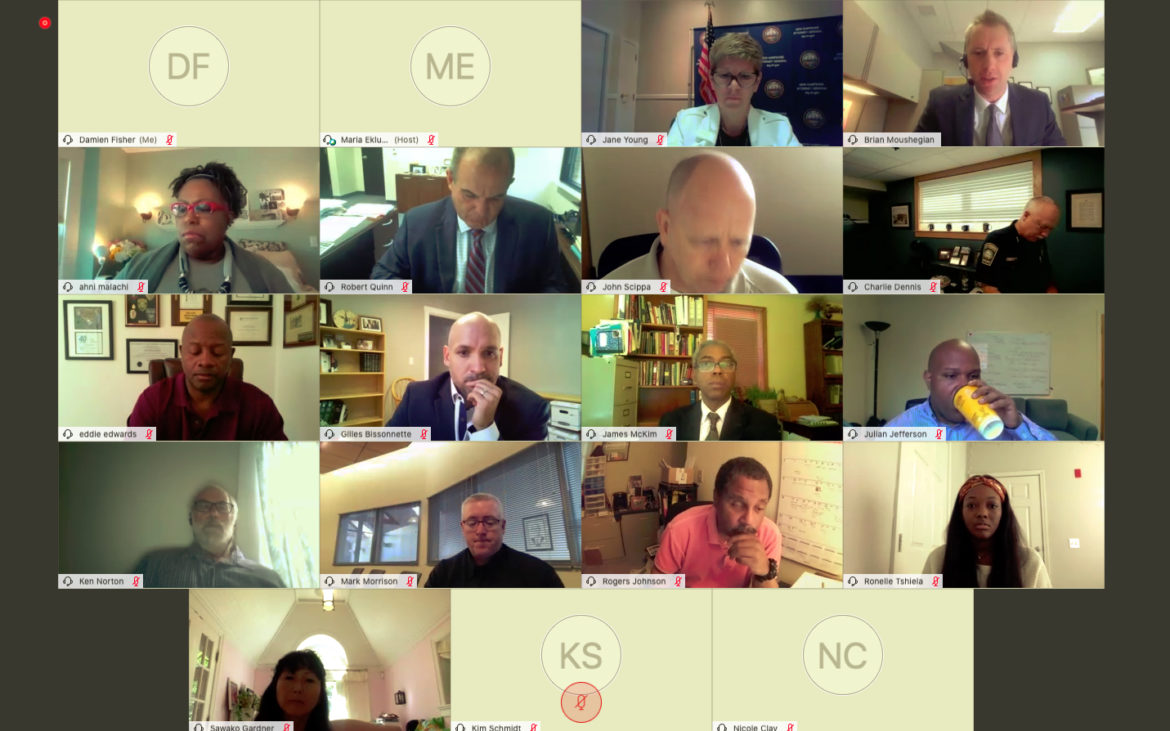See copy of the most recent redacted list here: https://drive.google.com/file/d/1PumiMcSlQCBqCm9sKkBYNJFUu10GWE8-/view?ts=5f371bab
By DAMIEN FISHER, InDepthNH.org
New Hampshire’s secret list of police officers who have been disciplined for dishonesty or excessive force problems should be open and police personnel records should be made public, according to the ACLU-NH’s Gilles Bissonnette.
“The Laurie List needs to be public,” Bissonnette said Tuesday. “People should know if the officers they are interacting with are on the list or not.”
Bissonnette, ACLU-NH’s legal director, spoke at the Commission on Law Enforcement Accountability, Community and Transparency meeting Tuesday as the group works on how to reform police discipline in the state. Bissonnette has been involved in legal challenges to the Laurie List, also known as the Exculpatory Evidence Schedule.
While Superior Court Judge Charles Temple has ruled that the Laurie List is a public record, New Hampshire Attorney General Gordon MacDonald is fighting to keep it secret. MacDonald appealed the ruling and it is scheduled for oral arguments before the New Hampshire Supreme Court in September.
Bissonnette said people should know about the discipline records of the police officers who are working in their communities. Having the secret list builds distrust between the public and the police, he said.
“The Laurie List secrecy hurts good officers, it creates suspicion in the public’s mind about all police officers,” Bissonnette said.
The commission will report out recommendations to Gov. Chris Sununu at the end of the month on reforms to the way police discipline is handled. Bissonnette wants the commission to end the Laurie List’s secrecy and make the list itself unnecessary by opening police personnel records. He also thinks that the state needs to stop using the legal doctrine of qualified immunity, which critics say protects police officers from consequences when they abuse their power on the job.
“I do think police can police without qualified immunity,” Bissonnette said.
Bissonnette said the legal doctrine of qualified immunity came into greater practice in the 1980s, and most police officers are legally protected in case of lawsuits stemming from their actions as officers without the use of qualified immunity.
“Qualified immunity is a pretty new construct,” he said.
Londonderry Police Lt. Mark Morrison, a commission member representing the New Hampshire Police Association, strongly objected to Bissonnette’s suggestion about qualified immunity. Morrison said without qualified immunity police officers can be sued on “frivolous” complaints.
“Officers would absolutely lose their homes,” Morrison said. “They would lose their savings and livelihoods.”
Other changes Bissonnette wants to see is the way police personnel records are retained. All municipal employees have their personnel records retained for 20 years, except for police. The individual police unions negotiate with the communities they serve for shorter retention periods for records. Bissonnette said all municipal employees ought to be treated the same and all records should be kept for 20 years.
“Police files should be no different,” Bissonnette said.
Bissonnette also said police need to stop so-called pretextual stops, which in practice is when a police officer follows a driver until that driver commits a moving violation. The officer will then use the traffic stop as context for a further investigation.
“Police are allowed to tail people indefinitely until they find a reason to stop them,” Bissonnette said.
Deputy Attorney General Jane Young disagreed with Bissonnette’s take, stating that pretextual stops are an important tool for law enforcement.
The commission also heard from Brian Moushegian, the general counsel for the New Hampshire Attorney Discipline Office. Moushegian went over the process for his office’s handling of attorney complaints. While there is more transparency in the attorney complaint process than currently for the police complaint process, unlike internal affairs investigations into police, Moushegian said his office will not deal with anonymous complaints.
The commission is expected to start again Wednesday with more questions for Bissonnette.





